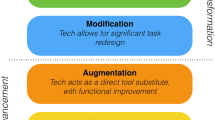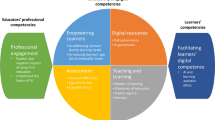Abstract
Computer literacy, media literacy, digital literacy and digital competence are all concepts that highlight the need to handle technology in our digital age. However, when it comes to teachers’ digital literacy there is a need to develop a more pedagogic-didactic content for digital literacy in order to deal with the way in which new digital trends influence the underlying conditions for schools, pedagogy and subjects. This theoretical article will therefore examine whether a broader view of knowledge (situated learning) can be a relevant theoretical underpinning for a new digital competence model for teachers and the Scandinavian English perception of the term competence. The article is particularly angled towards how the complexity of teachers’ digital literacy makes it necessary to expand our traditional perception of this concept. The implications of the article indicate that five vital structures are found to be essential to perceptions amongst teachers of the importance of Information- and Communication Technology (ICT) and achievement of digital competence.

Similar content being viewed by others
Notes
Although the addition of the use of digital artefacts as the fifth core competence in the K-06 curriculum (KD 2006a, b) could be described as a historic event, disagreement remains over the use of terminology in the new curriculum and over whether the curriculum fully captures the essence of digital competence (Erstad 2007).
References
Buckingham, D. (2003). Media education: Literacy, learning and contemporary culture. Cambridge: Polity Press.
Buckingham, D. (2006). Defining digital literacy. Nordic Journal of Digital Literacy, 4(1), 263–276.
Engeström, Y. (1987). Learning by expanding. Helsinki: Orienta-Konsultit.
Erstad, O. (2005). Digital kompetanse [Digital Literacy; in Norwegian] Oslo: Universitetsforlaget.
Erstad, O. (2007). Den femte grunnleggende ferdighet: Noen grunnlagsproblemer. Norsk Pedagogisk Tidsskrift, 1, 43–55 The fifth basic competence. Some foundational problems; in Norwegian.
Gilster, P. (1997). Digital literacy. New York: Wiley Computer.
ITU (The Network for IT Research and Competence in Education) (2005). Digital skole hver dag [Digital school every day; in Norwegian]. Oslo: ITU. Retrieved April 20, 2006, from http://www.itu.no/filearchive/Digital_skole_hver_dag.pdf.
KD (Ministry of Education and Research) (2006a). Læreplan for den 13-årige grunnopplæringa (K-06) [The national curriculum for primary and secondary education; in Norwegian]. Oslo: Government Administration Services.
KD (Ministry of Education and Research) (2006b). Prinsipper for opplæringen [The quality framework; in English and Norwegian]. Oslo: Government Administration Services.
Knobel, M. (1999). Everyday literacies. New York: Peter Lang.
Krumsvik, R. (2006). ICT-initiated school development in lower secondary school. Ph.D. thesis. The University of Bergen. Bergen: Allkopi.
Krumsvik, R. (2007a). Ein modell for digital kompetanse for lærarar [A model of digital competence for teachers] Unpublished paper. Bergen: UoB.
Krumsvik, R. (Ed.). (2007b), Skulen og den digitale læringsrevolusjon [The school and the digital learning revolution; in Norwegian]. Oslo: Universitetsforlaget.
Krumsvik, R. (2008). The emerging digital literacy among teachers in Norway (The story of one digital literate teacher). In R. Kobayashi (Ed.), New educational technology (pp. 105–125). New York: Nova Science.
KUF (Ministry of Education and Research). (1996). Læreplanverket for den 10-årige grunnskolen [The national curriculum for primary and lower secondary school; in Norwegian] Oslo: Nasjonalt Læremiddelsenter.
Lanham, R. (1995). Digital literacy. Scientific American, 273(3), 160–161.
Lankshear, C., & Knobel, M. (2006). Digital literacy and digital literacies. Nordic Journal of Digital Literacy, 1(1), 12–24.
Lave, J., & Wenger, E. (1991). Situated learning: Legitimate peripheral participation. Cambridge: Cambridge University Press.
Lave, J., & Wenger, E. (2003). Situeret læring. Copenhagen: Hans Reitzels Forlag.
Mantovani, G. (1996). New communication environments. From everyday to virtual. London: Taylor & Francis, Ltd.
Mishra, P., & Koehler, M. J. (2006). Technological pedagogical content knowledge: a new framework for teacher knowledge. Teachers College Record, 108(6), 1017–1054. doi:10.1111/j.1467-9620.2006.00684.x.
Paris. (2008) Retrieved 20.04.08 from: http://www.oecd.org/dataoecd/1/1/38358359.pdf.
Pedro, F. (2006). The new millennium learners: challenging our Views on ICT and Learning. OECD-CERI.
Shulman, L. S. (1987). Knowledge and teaching: foundations of the new reform. Harvard Educational Review, 57, 1–22.
Tyner, K. (1998). Literacy in a digital world: Teaching and learning in the age of information. New Jersey: Lawrence Erlbaum.
Wenger, E. (1998). Communities of practice: learning, meaning, and identity. New York: Cambridge University Press.
Wenger, E. (2001). Supporting communities of practise. A survey of community oriented technologies. How to make sense of this emerging market, understand the potential of technology and set up a community platform. USA. Retrieved 20.04.2003 from: http://www.ewenger.com/tech/.
Author information
Authors and Affiliations
Corresponding author
Rights and permissions
About this article
Cite this article
Krumsvik, R.J. Situated learning and teachers’ digital competence. Educ Inf Technol 13, 279–290 (2008). https://doi.org/10.1007/s10639-008-9069-5
Published:
Issue Date:
DOI: https://doi.org/10.1007/s10639-008-9069-5




